SAARC Cultural Centre Presents World Puppetry Day Celebrations On Friday 5th April 2024 At Moon Bastion, World Heritage City of Galle at 7:00 pm . A Special School Show will be held @ 3:00 pm at the Moon Bastion, World Heritage City of Galle.
SAARC Cultural Centre, Colombo is presenting its upcoming Second Session of the SAARC Talk Series 2024 on 20th February 2024 (Tuesday) at 3:00 pm (Sri Lanka Standard Time). The lecture will be delivered by Dr. Shrikant Ganvir, Assistant Professor, Dept of A.I.H.C. and Archaeology, Deccan College PGRI, Deemed to be University, Pune, India.
Dr. Shrikant Ganvir will deliver his lecture on the topic “Sacred Landscape of the Buddhist Monastic Sites of North-eastern Andhra Pradesh, India”.
The presentation is open to public. To attend kindly register at the link given below.
Please click here to register
Meeting link: https://meet.google.com/dnq-eyuq-asi
Do spread the word. We look forward to your participation and engaging discussions during this enlightening lecture.
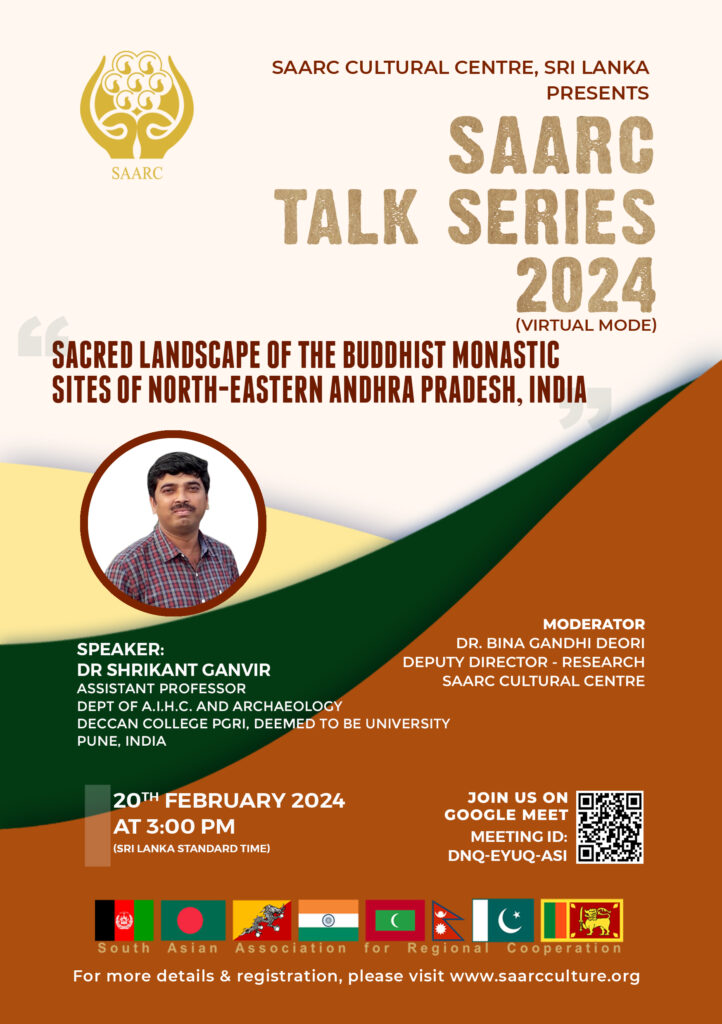
SAARC Cultural Centre, Colombo is presenting its upcoming First Session of the SAARC Talk Series 2024 on 30th January 2024 (Tuesday) at 3:00 pm (Sri Lanka Standard Time). The lecture will be delivered by Prof. Swadhin Sen, Department of Archaeology, Jahangirnagar University, Bangladesh.
Prof. Swadhin Sen will deliver his lecture on the topic “Breaking the Spatiotemporal Boundaries of Continuity and Change: Thinking About Archaeology of Bangladesh”.
The presentation is open to public. To attend kindly register at the link given below.
Please click here to register
Meeting link: https://meet.google.com/utq-jgep-cre
Do spread the word. We look forward to your participation and engaging discussions during this enlightening lecture.
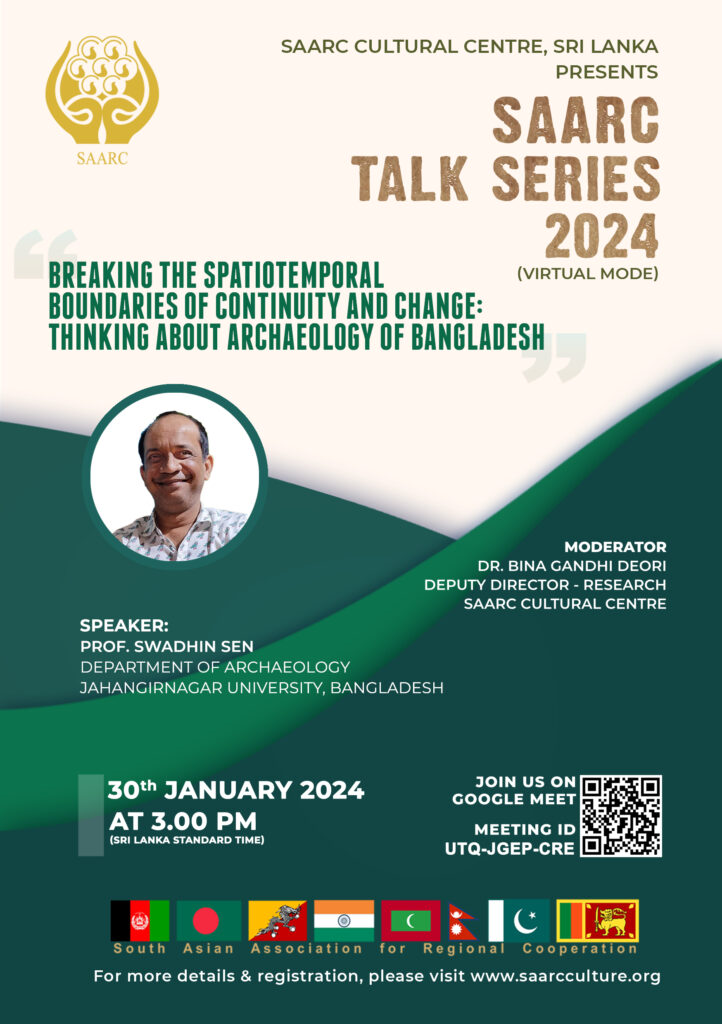
SAARC Cultural Centre, Colombo is presenting its upcoming Eighth SAARC Talk Series on 6th December 2023 (Wednesday) at 2:00 pm (Sri Lanka Standard Time). The lecture will be delivered by Eng.(Dr.) Sanath Panawennage, Director General and Chief Executive of the Arthur C Clarke Institute for Modern Technologies, Colombo,Sri Lanka
Eng.(Dr.) Sanath Panawennage will deliver his lecture on the topic “Preserving South Asia’s Cultural Heritage: ‘Space’ as a Decisive Enabler”.
The presentation is open to public. To attend kindly register at the link given below.
Please click here to register
Meeting link: https://meet.google.com/jfz-krot-mnm
Do spread the word. We look forward to your participation and engaging discussions during this enlightening lecture.
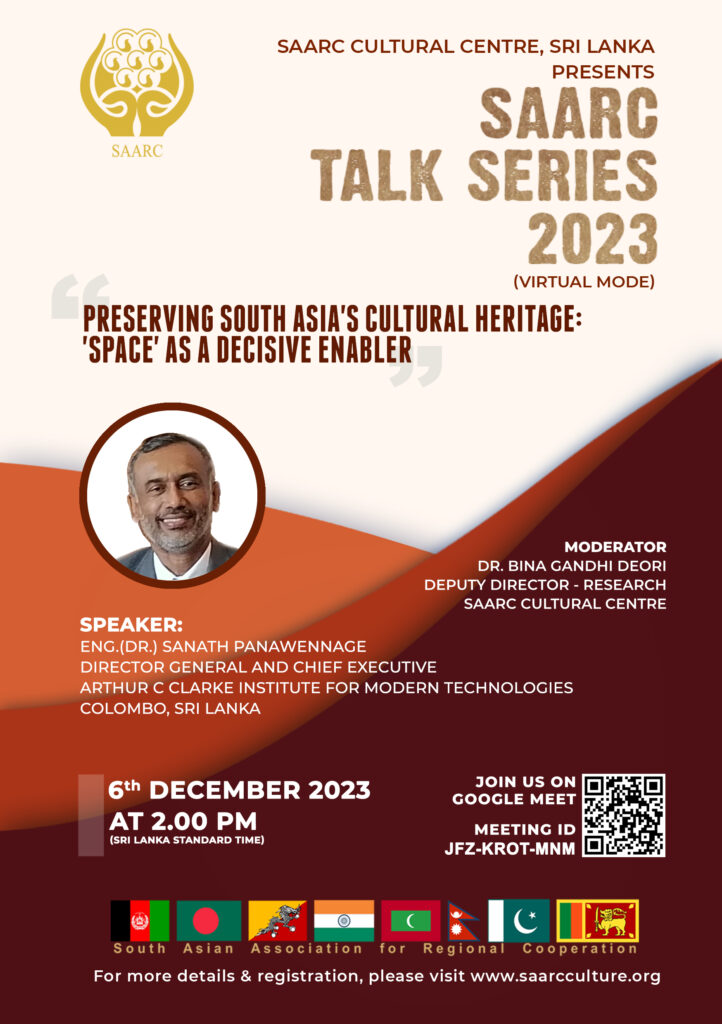
SAARC Cultural Centre, Colombo is presenting its upcoming Seventh SAARC Talk Series on 24th November 2023 (Friday) at 3:00 pm (Sri Lankan Standard Time). The lecture will be delivered by Kamalika Bose, Urban Conservationist, Founder-Principal, Heritage Synergies India.
Kamalika Bose will deliver her lecture on the topic “Building Regional Cooperation through Shared Cultural Heritage of Kolkata and Dhaka”.
The presentation is open to public. To attend kindly register at the link given below.
Please click here to register
Meeting link: https://meet.google.com/ois-xcky-nfn
Do spread the word. We look forward to your participation and engaging discussions during this enlightening lecture.
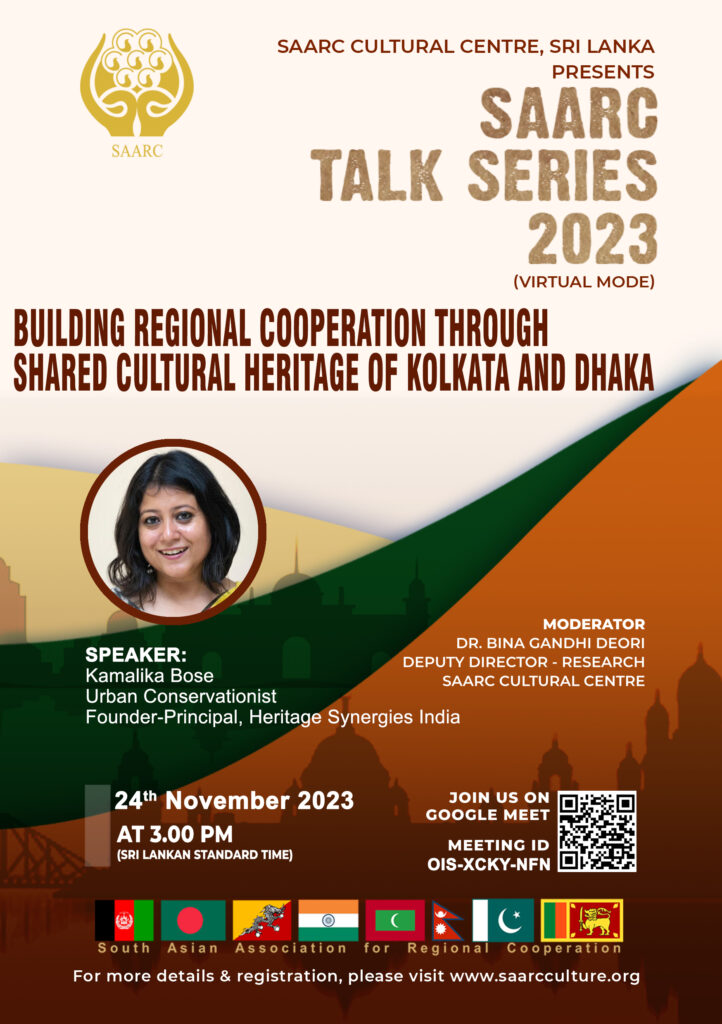
Captivating Canvasses of the Vibrant Colours of Culture is an Exhibition of Paintings organized by the SAARC Cultural Centre (SCC) in Collaboration with the Royal Asiatic Society of Sri Lanka. The SCC is the custodian of a large collection of paintings created by the artists of the SAARC Region during the SAARC Artists’ Camps held annually from 2011 to 2019. This Exhibition is organized to create an understanding of the cultures of the SAARC Member States as depicted through the artists of the Region.
The exhibition will be held at the Royal Asiatic Society premises at the Mahaweli Centre.
Date: 7th to 10th November 2023
Inauguration: 7th November 2023 at 11am
Venue: Royal Asiatic Society of Sri Lanka, No. 96, Ananda Coomaraswamy Mawatha, Colombo 07.
All are welcome.
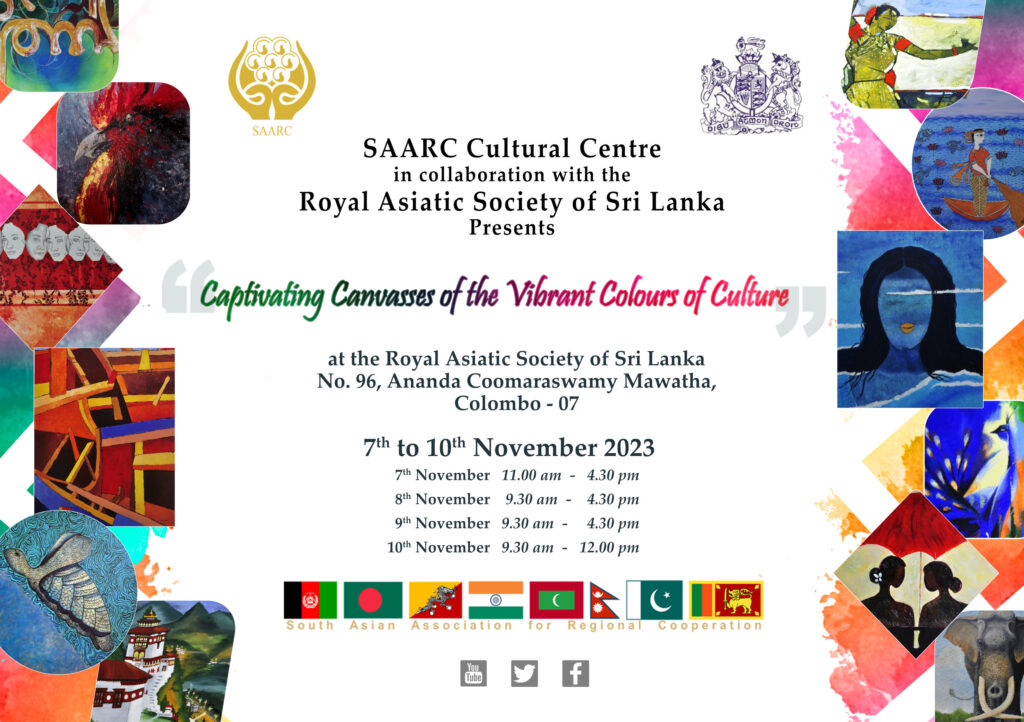
SAARC Cultural Center observed the 36th SAARC Charter Day on the 8th of December 2020 at the Centre premises in a very charming, yet in an elegant manner to embrace the decisive steps taken by the Heads of Eight Member States to develop South Asia’s unique identity through its Cooperation towards each member state. This day marks the adoption of SAARC Charter which reckoned the establishment of South Asia’s Regional Cooperation (SAARC) at its very first Summit meeting held in Dhaka in 1985 with the inaugural participation of all the Heads of States.
As we celebrate the 36th year of commemoration, Member States of the SAARC show cased the re-affirmation of their strong commitment towards fostering the mutual connectivity within the region and stabilizing the regional ties. It recognizes the determination and commitment of the Member States of Afghanistan, Bangladesh, Bhutan, India, Maldives, Nepal, Pakistan, and Sri Lanka in furthering the acceleration of socio economic and cultural development in the region.
Through out the past decade, with the establishment of SAARC Cultural Centre in Colombo, Sri Lanka in 2009, with the gracious imagination and the Great Vision and Mission of the former President His Excellency Mahinda Rajapaksha (presently the Honourable Prime Minister and the Honourable Minister of Buddha Sasana and Cultural Affairs) it has been functioning as the Centre par Excellence in restoring, developing and promoting the culture and its distinctive aspects of the region through a variety of activities and Research to facilitate the cultural development within the region. The Centre has paved the path for many cultural programmes intending to cultivate the mutuality in cultural cooperation. SAARC Charter Day, one of the highlights in the Calendar of Activities of the Centre, marks and symbolizes the utmost commitment and the accomplishment of the Member States in pursuing and attaining its goals.
However, the year 2020 witnessed a reception attended by a limited number of officials representing the SAARC Cultural Centre, due to the prevailing COVID-19 Pandemic situation as it affected the activities of proposed by the Center as well. Therefore, the 36th SAARC Charter Day was not grandeur as it was before, and held keeping the health guidelines issued by the respective authorities of the host country and the instructions given by the SAARC Secretariat.
Thus, the reception commenced with the Director’s welcome of the officials of the SAARC Cultural Centre, and a brief of the History and significance of the SAARC Charter Day. Thereafter, she orated the Message of His Excellency the President of the Democratic Socialist Republic of Sri Lanka, Mr. Gotabaya Rajapaksa (Click here) The President has made a special reference to the recent efforts taken in establishing and moderating SAARC COVID-19 emergency fund and its operationalization. Further he has reaffirmed the continuous support and firm commitment to the SAARC process and progress.
Following the oration of the His Excellency the President, she orated the message sent by the Honourable Prime Minister and the Minister of Buddha Sasana and Cultural Affairs of the Democratic Socialist Republic of Sri Lanka, Mr. Mahinda Rajapaksa. The speech made the point of placing utmost commitment to make the regional mechanism dynamic and result oriented for the benefit of common progress of the region. Further the message noted Sri Lanka’s full and firm commitment to taking forward the organisation and its principles (Click here).She further orated the message sent by His Excellency the Secretary General of the SAARC. Mr. Esala Ruwan Weerakoon. His message marked the appreciation towards the initiative of SAARC Covid-19 emergency fund and commended the continuous efforts of the Member States in mitigating the Covid-19 pandemic (Click here).
Later, the Director invited the Deputy Director for Programmes to read out the message sent by the Honourable Minister of Foreign Affairs Mr. Dinesh Gunawardena of the Democratic Socialist Republic of Sri Lanka. He made a special reference highlighting Sri Lanka’s cooperation and firm determination in achieving shared vision of achieving prosperity for the people of the region (Click here).
Following the oration of the felicitation messages, the reception concluded with serving of refreshments to the officials present.
i. Date: 8th March 2020
ii. Venue: Bangladesh
iii. Programme: Non-Participatory
iv. Theme: “Women in Handicraft sector of Bangladesh”
8th of March is observed as the SAARC International women’s Day coinciding with the International Women’s Day celebrations held around the globe. This year, the Centre organizes this programme in association with the Ministry of Women and Child affairs of Bangladesh. The 2020 programme aims at recognising “Women in Handicraft sector of Bangladesh”.
Handicrafts of Bangladesh can be traced back to the time immemorial and it includes textile, metal works, jewelry, woodworks, clay, pottery and jute products. Over the time, the handicrafts of Bangladesh have gained much attention and still in the momentum of acquiring recognition around the globe. Women play a predominant role in the handicraft sector of Bangladesh comprising of self-employed & home-based workers. As this year’s celebrations are taking place in Bangladesh, the role of women in Handicrafts sector of Bangladesh will be highlighted.
The focus of the programme is a Forum of discussion titled ‘Expression of Womanhood through Handicrafts’. This forum is expected to generate productive outcomes that would be instrumental in the development of Handicrafts sector. Significantly to discuss matters which are more relevant to the handicraft sector in the region of South Asia; like using online platform for marketing, highlighting sustainable materials of the handicrafts, relating crafts and folk-tales. The programme will acknowledge prominent women personalities from the Handicraft sector of Bangladesh. The key note address will focus on prospective aspects of crafts as the only alternative for sustainable life products. Through this Forum, speakers will be sharing their life journey as artisans: their challenges and successes. The SAARC Cultural Centre strongly believes that this interactive platform would facilitate the exchange of experiences and will spark the motivation and confidence among the women aspirants.
1. BACKGROUND
The “South Asian Cultural Trails” was approved by the 18th SAARC Summit in Kathmandu in November 2014. The Islamic Cultural Trails is the third Research Grant on South Asian Cultural Trails and was approved by the 10th Governing Board Meeting of the SAARC Cultural Centre and the 56th Session of the Programming Committee of SAARC. The Research Grants will provide an opportunity for the Member States to explore new research areas and sites along the Islamic Cultural Trails. This will also act as a precursor to the Cultural Trails proposed for the future and lay the ground work in research to look at Cultural Trails as connected routes where ideas, information and knowledge travelled in all directions. 8 Research Grants will be disbursed, one for each Member State.
2. OBJECTIVES OF THE RESEARCH GRANT
2.1 To encourage new research through the SAARC Research Grants on the Cultural Trails of the SAARC Region.
2.2 To encourage new research on identification of new sites, locations, cultural trails, tangible and intangible heritage associated with Islamic Cultural Trails.
2.3 To facilitate new research and new approaches to study the Islamic Cultural Trails as an integrated entity.
2.4 To study and analyse all different perspectives and areas which influenced the establishment, development and continuation of the Cultural Trails in the Region.
2.5 To present innovative measures for the conservation and preservation of tangible and intangible cultural heritage of the SAARC Region.
3. RESEARCH GRANT OVERVIEW
One research proposal will be selected from each Member State to be awarded the short-term Research Grant of US$ 1,000/=. The selection of Research Proposals will be carried out by a team of experts selected by the SAARC Cultural Centre.
The SAARC Cultural Centre invites Academics and Researchers from Member States to submit detailed Research Proposals (along with the detailed budget breakdown for US$ 1,000/=) for new and innovative short-term research projects on the Islamic Cultural Trails. The first instalment of the grant (US$ 500/=) will be made at the commencement of the Research Project. The final payment is subject to the review of the final presentation made to a team of experts via video conferencing and submission of the Final Research Report. Any suggestions / recommendations made by the SCC team of experts at this stage should be included in the research process by the respective researchers.
At the completion of the research project, each researcher will be required to submit a Research Report of academic quality to be published in the “South Asian Cultural Trails” publication series of the SAARC Cultural Centre in 2020. Academics and Researchers are encouraged to present the Research Project at a local or international forum within one year and to disseminate the knowledge gathered with the relevant stakeholders (academic discussion, tourism industry, sustainable development, etc.). Relevant documents with regard to the above dissemination of information should be sent to the SCC.
4. RESEARCH PROJECT THEMES
The following themes have been identified for the Research Seminar and Research Grant on Islamic Cultural Trails. However, research proposals based on different themes will also be accepted depending on their content and relevance to the Islamic Cultural Trails.
4.1 Islamic Cultural Trails – (Refer to Annexure 1 for Details).
4.2 Identification of New Sites and Locations along the Islamic Cultural Trails.
4.3 Comparative Studies of Islamic sites (monuments, mosques, minarets, tombs, etc.,) in the Region.
4.4 Comparative Research and interpretation of Landscape values of Islamic gardens.
4.5 Travels of Islamic Pilgrims.
4.6 Cultural Symbolism of Islam.
4.7 Art and Architecture of ICT.
4.8 Archaeology of ICT.
4.9 Intangible Heritage of ICT (Music, dance, folk art, folk stories, traditional healing, handicrafts, etc.).
4.10 Trade and Commerce of ICT.
4.11 Manuscripts, texts and inscriptions, languages and scripts of Islam.
4.12 Technology of ICT (Irrigation, engineering, agriculture, etc.)
4.13 Cultural Diffusion of Islam.
4.14 Heritage Management of ICT sites.
4.15 Tourism promotion of ICT.
5. ELIGIBILITY
5.1 Academics, Scholars and Researchers of the SAARC Member States.
5.2 Academics, Scholars and Researchers who have received Research Grants from the SAARC Cultural Centre previously will not be eligible.
6. APPLICATION PROCESS
6.1 Format for the Application is attached herewith as Annexure 2
6.2 Each Member State can forward any number of Research Proposals for consideration.
6.3 Research Proposals should be for an innovative and new research based on the themes mentioned above (No. 4 of this document).
6.4 New themes related to Islamic Cultural Trails.
6.5 All sections of the application should be completed (Part A, B and C).
6.6 Incomplete applications will not be considered.
6.7 Applications must be forwarded to the SAARC Secretariat in Kathmandu, Nepal through the Ministry of Foreign Affairs/Ministry of External Affairs of the Member State.
6.8 An advance copy can be emailed to the SAARC Cultural Centre – scc@saarcculture.org with copy to dd-research@saarcculture.org
6.9 All Research Proposals must reach the SAARC Cultural Centre by 31st October 2019.
6.10 The Research Grant will be distributed in 2 instalments – The first instalment (US$ 500/=) at the commencement of the project and final instalment (US$ 500/=) after the submission of the final report with reviewers’ comments.
6.11 Each recipient of the SAARC Research Grant must submit a research report of academic quality.
6.12 The final payment is subject to the review of the final presentation made to a team of reviewers via video conferencing. Any suggestions/recommendations made by the SCC team of reviewers at this stage should be included in the research process by the respective researchers.
7. TIME SCHEDULE
7.1 Deadline for accepting research proposals – 31st October 2019
7.2 Selection of research proposals – 30th November 2019
7.3 Commencement of the research -10th December 2019
7.4 Submission of final report – 31st March 2020
7.5 Presentation of the research to the team of reviewers – May 2020
7.6 Resubmitting the research report with reviewers’ comments – June 2020
1) INTRODUCTION
SAARC Cultural Centre will be holding the SAARC Film Festival for the 9th consecutive year in 2019 in Sri Lanka. The SAARC Film Festival has built a reputation as being a very important platform and focal point for the promotion, celebration and enjoyment of some of the best films from the SAARC Region. A reputed panel of international judges will select the best films and recognise the individuals who are at the very core of this creativity as a form of encouragement and respect to continue producing quality, thought provoking and representational films for the Region.
The SAARC Film Festival 2019 will focus on films created in South Asia and first screened after 1st May 2017. Directors and artistes of these films will be invited to participate in the workshop, which is conducted to encourage and improve future productions.
Please send in nominations and benefit from the exposure this magnificent event will bring to the industry, artistes, vision and creativity of the directors and movie makers of each valued SAARC Member State. Most importantly, be present as we showcase a very special part of culture and art within our varying and wonderfully diverse Member States.
As such, the SAARC Cultural Centre looks forward to receiving the valued nominations of Member States at the earliest convenience and no later than the deadlines specified below. We warmly invite the Member States to join us, as we resume our journey in 2019 to bring South Asian film to the forefront of the international film world.
2) FILM CATEGORIES FOR NOMINATIONS
There will be three film categories open for nominations at the SAARC Film Festival 2019:
3) SAARC FILM FESTIVAL RULES AND REGULATIONS (CATEGORY A & CATEGORY B)
4) MASTER FILMS
5) DATES AND VENUE
Dates: 2nd – 7th July 2019, including the following:
Venue: The Cinema Hall, National Film Corporation, Sri Lanka
6) SAARC FILM AWARDS 2019
The following 12 Awards will be presented at the SAARC Film Awards 2019 on the 7th July 2019, selected by a panel of jury members from non-SAARC Member States. The decision of the panel will be final.
7) PARTICIPATION OF FILM DIRECTORS AND OTHER FILM ARTISTES
8) OTHER TECHNICAL REQUIREMENTS
1. All films submitted for the Festival (Feature Films, Short Films and Master Films) should be submitted in DCP in 2K/4K (D Cinema) format or Blu – ray format and downloadable data format.
2. Downloadable data format specifications:
If the film is available in a different file format or on DVD, a conversion to H.264 is recommended. File conversion is offered by the software “HandBrake”, which is free of charge and available for all popular computer operating systems.
3. Please ensure that the films submitted are not defective, are in the required format as stated above in Section 8, and are individually labelled, including the running time of each film.
4. As the aim of the Festival is to promote culture, new trends and ideas, there are no restrictions on themes and topics subject to section 3 (IV) above.
5. All films will be subject to approval from the Sri Lankan Public Performance Board prior to screening at SAARC Film Festival 2019
6. Member States must deliver 3 COPIES (Public Performance Board, records and screening) of the final format to the SAARC Cultural Centre as detailed above in Section 8 for the Festival screening, NO LATER THAN 8th April 2019.
7. For publicity purposes, please include a standard Press Kit with the required information, giving special consideration to the following:
8. In addition to the Registration form, please email the information stated above in Section 8 (7) NO LATER THAN 8th APRIL 2019 to:
9) DATES FOR SUBMISSION, DEADLINES & NOMINATION PROCESS
10) SCREENING OF FILMS AFTER THE FESTIVAL
The SAARC Cultural Centre wishes to contact the Directors/Producers of the Feature Films and Short Films to obtain permission to screen their films at appropriate official SAARC Cultural Centre events. Please tick the appropriate box in the application form (attached) if the Directors/Producers are willing to be contacted for permission to screen their films. Films will only be screened with the prior written permission of the Directors/Producers of the films.